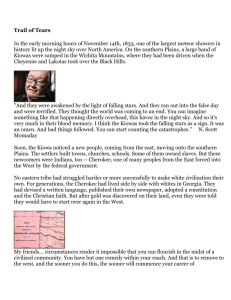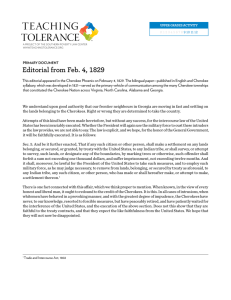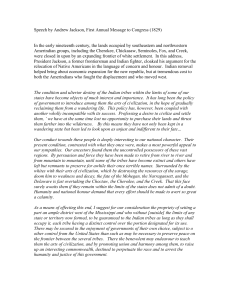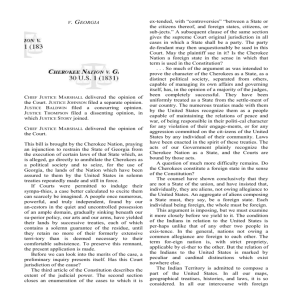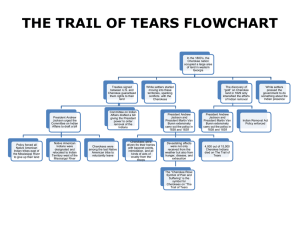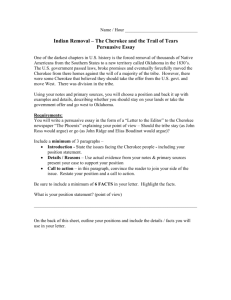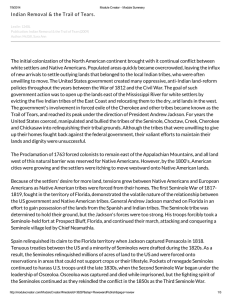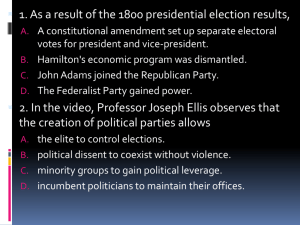Walter Fleming October 21, 2010 The Constitution and America's
advertisement
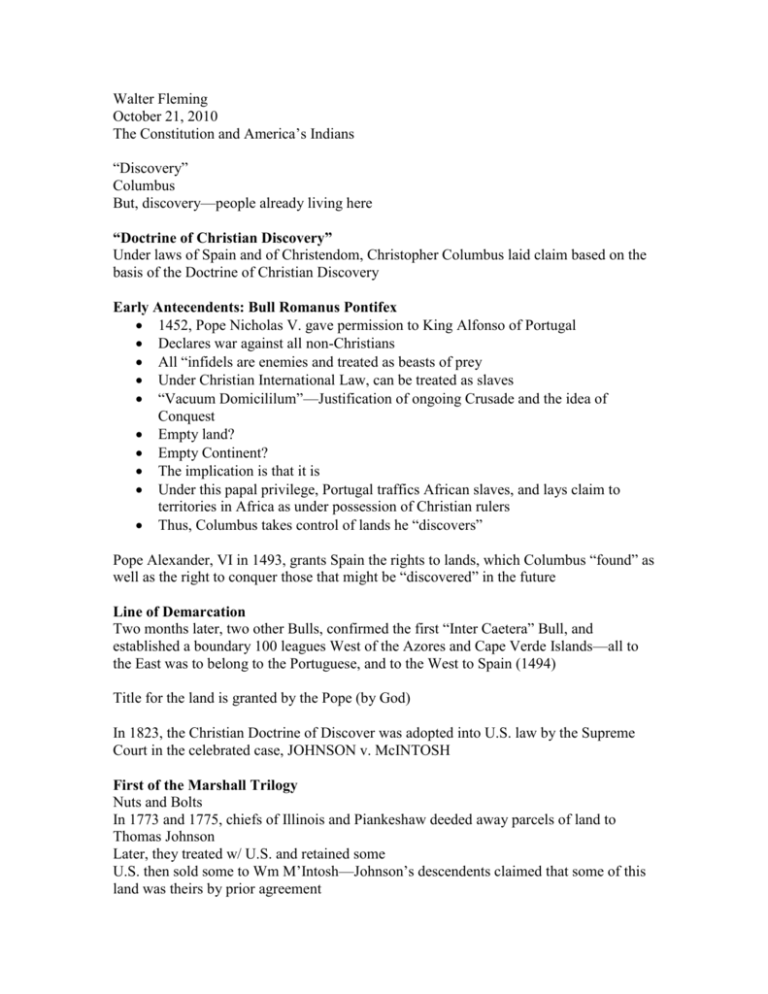
Walter Fleming October 21, 2010 The Constitution and America’s Indians “Discovery” Columbus But, discovery—people already living here “Doctrine of Christian Discovery” Under laws of Spain and of Christendom, Christopher Columbus laid claim based on the basis of the Doctrine of Christian Discovery Early Antecendents: Bull Romanus Pontifex 1452, Pope Nicholas V. gave permission to King Alfonso of Portugal Declares war against all non-Christians All “infidels are enemies and treated as beasts of prey Under Christian International Law, can be treated as slaves “Vacuum Domicililum”—Justification of ongoing Crusade and the idea of Conquest Empty land? Empty Continent? The implication is that it is Under this papal privilege, Portugal traffics African slaves, and lays claim to territories in Africa as under possession of Christian rulers Thus, Columbus takes control of lands he “discovers” Pope Alexander, VI in 1493, grants Spain the rights to lands, which Columbus “found” as well as the right to conquer those that might be “discovered” in the future Line of Demarcation Two months later, two other Bulls, confirmed the first “Inter Caetera” Bull, and established a boundary 100 leagues West of the Azores and Cape Verde Islands—all to the East was to belong to the Portuguese, and to the West to Spain (1494) Title for the land is granted by the Pope (by God) In 1823, the Christian Doctrine of Discover was adopted into U.S. law by the Supreme Court in the celebrated case, JOHNSON v. McINTOSH First of the Marshall Trilogy Nuts and Bolts In 1773 and 1775, chiefs of Illinois and Piankeshaw deeded away parcels of land to Thomas Johnson Later, they treated w/ U.S. and retained some U.S. then sold some to Wm M’Intosh—Johnson’s descendents claimed that some of this land was theirs by prior agreement Chief Justice John Marshall Christian European nations had assumed “ultimate dominion” over the lands of America during the Age of Discovery Upon “discovery,” Natives lost their rights to complete sovereighnty, as independent nations,” And only retained a right of occupancy Up-Shot Marshall’s decision: tribes can’t convey title without the consent of the federal government Discovery gave title to government (U.S.—even though there was no U.S. at the time of discovery) In the Face of Other Options (Colonial Experiences) French, English, and Spanish Spanish: Conquest of “new world” Forced labor Encomienda Repartimento (divide indigenous communities) Convert to Catholicism French: Fur Trade Cultural pluralism and relative lack of conflict in what is now Canada French-Indian relations were peaceful because there wasn’t as much settlement French needed Indian co-operation for them to be successful in the Fur Trade Policy was to turn Indian peoples into French—Jesuits and Fancisation Remake their culture into French Native-ation (result was French became more like native peoples than the native peoples became like the French) British Indian Policy: Aversion Wanted to avoid war (can’t colonize and get people to settle if there is conflict) Used Native lands to separate Whites from Indians Negotiated to acquire lands Indian Boundary Lines Ohio River becomes a boundary (then Mississippi) Northwest Ordinance 1787-Continental Congress passes the Northwest Ordinance Contained a section titled the Utmost Good Faith Law (land and property shall never be taken from them without their consent) General Overview of Constitutional Inclusion Commerce Clause (Article I, Section 8) Implied powers in Treaty-Making Article 1, section 8, clause 3 Congress has power to “regulate Commerce with foreign Nations, and among the several States, and with the Indian tribes” Cherokee Nation v. Georgia (1831) Gold discovered on Cherokee land Nation is within boundaries of the state of Georgia State of GA began passing laws regulating Cherokee lands, violated Cherokee sovereignty Cherokee sue Marshall Trilogy, Part Deux Article 3, section 2, clause 1 Judicial powers regarding controversies B/T a State and foreign citizens Are Indians citizens of a foreign state? Tribes are “domestic dependent” nations Their relationship to the U.S. resemble that of a ward to his guardian” Indian tribes were “ a distinct political society, separate from others, capable of manager [their] own affairs and governing [themselves].” All this resolves is the status of Indians, but doesn’t resolve issue of GA state laws applying to Cherokee Worcester v. Georgia (1832) Worcester lived on Cherokee lands (with their permission), but didn’t have a “license” from the state of GA to live on Cherokee land Marshall’s Decision Cherokee laws are the supreme law of the land (in Cherokee Nation.) GA law does not apply to Indian lands—STATE laws do not apply (but FEDERAL laws do) President Andrew Jackson refused to enforce the decision and continued to pressure the Cherokees to leave the Southeast (did he say, “Marshall has ruled, now let him enforce it!” “Plenary Power” “Complete, entire, perfect, possessing full power or authority” Federal government now becomes absolute Paradox? Are tribes sovereign? Or, are they under the control of the government? Tribes vs. Nation Tribe political or Nation identity Overlap between Christianity in Europe during the Crusade
